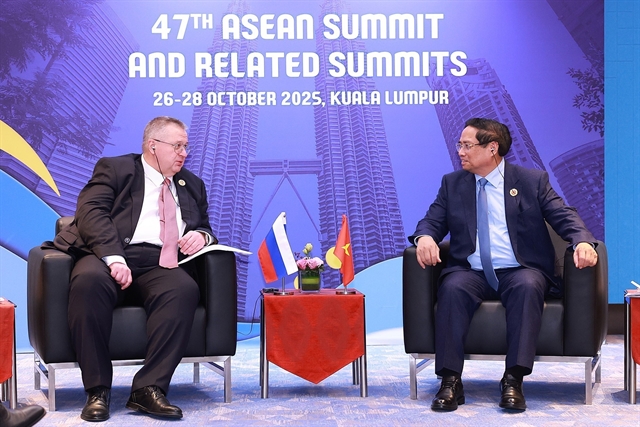 Society
Society

 |
| Prime Minister Phạm Minh Chính meets Russian Deputy Prime Minister Alexey Overchuk on the sidelines of the 47th ASEAN Summit. — VNA/VNS Photo Dương Giang |
KUALA LUMPUR — Việt Nam and Russia have agreed to develop a railway project linking the two countries via China and Mongolia to strengthen transport connectivity and expand regional economic cooperation.
Russian Deputy Prime Minister Alexey Overchuk announced the plan at a meeting with Vietnamese Prime Minister Phạm Minh Chính on the sidelines of the 47th ASEAN Summit and Related Summits in Kuala Lumpur, Malaysia.
Under the agreement, transport enterprises of Russia, Việt Nam, and China will orchestrate concrete steps for the development of the railway in 2025. Financial issues will be settled through coordination between specialised agencies and the private economic sector.
Việt Nam signed a technical support agreement with China, while Russia’s FESCO Transportation Group plans to increase direct cargo train frequency to a record six trips per month, two for import and four for export.
Overchuk described Việt Nam as a time-honoured and trustworthy partner of Russia, affirming that cooperation with the Southeast Asian country is a leading priority of Russia.
The line, stretching more than 2,200km, will mostly handle exports from Russia’s Tuva region, Mongolia, and southern China. Along with bringing economic value, the project holds strategic importance as it is expected to strengthen Russia’s position in the Eurasian transport network while providing Việt Nam with opportunities to expand its logistics infrastructure and seaport system.
Experts said that this is a key project of the Eurasian region in the near future. Capital mobilisation and human resources exchange are being carried out in tandem with technical assessments. If the line is completed on schedule, it will reshape regional trading routes, bolster economic ties, and provide an effective alternative to traditional maritime shipping routes. — VNA/VNS